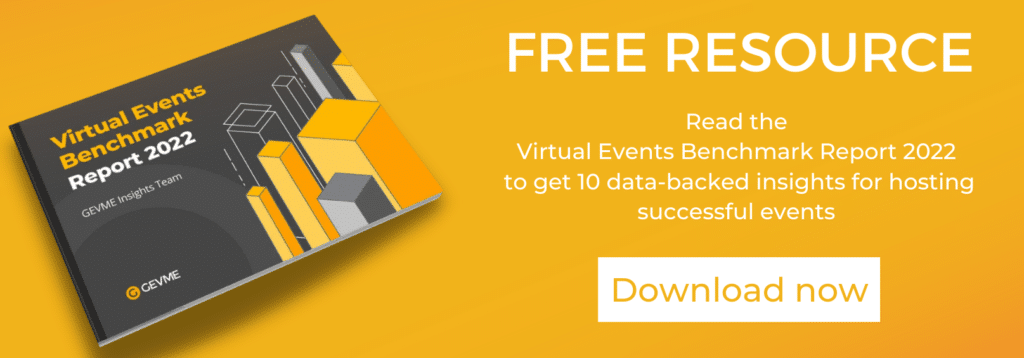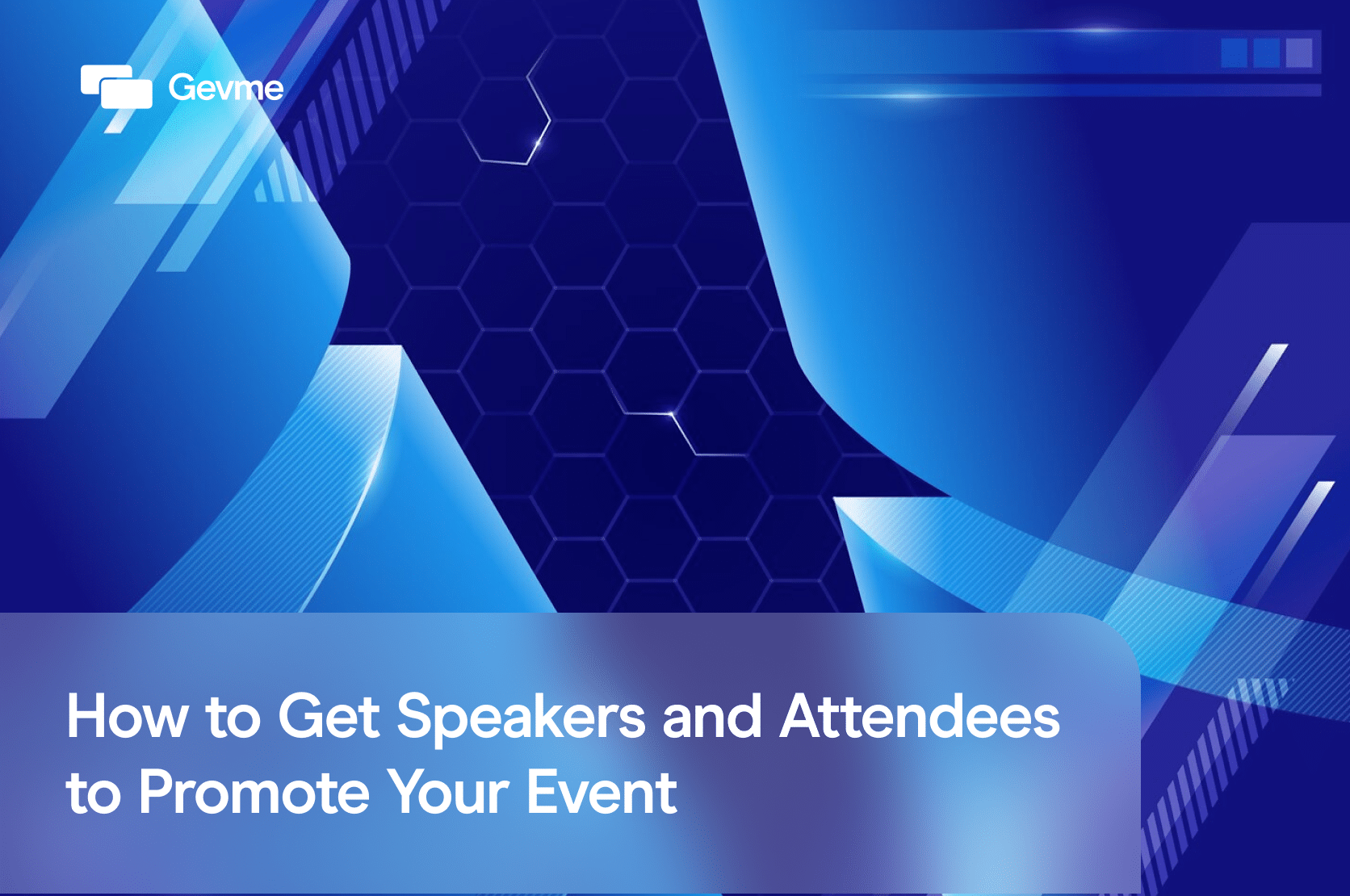Acing your event promotion strategy is often a challenging task. You may have an outstanding line-up of speakers for your event, a repository of informational content for attendees, a strong agenda and everything in between.
But to create a buzz about your event, you need a solid event promotion strategy.
You may send invitations to people on your company’s mailing list or even create pop-ups on your website about your event. However, promoting it requires more than the same old methods.
As an event planner, you certainly want your event to be impactful. And while you may already have all the resources to create a memorable experience for your attendees, creating a buzz prior to the main event can be a total gamechanger.
So a better and often more effective way to promote your event is to get speakers and attendees to promote your events – as they are a valuable asset to help you reach new audiences.
But what’s the right way to get your event speakers and attendees to spread the word about it?
Our team found the answer to this on the second episode of Event Exchange.
This episode features Tamar Beck, CEO of Gleanin – a community marketing platform built for event marketers. Gleanin provides event marketers with powerful word of mouth tools that reach and convert new attendees for their events.
The rise of new event formats in the last couple of years has challenged the conventional methods of promoting events. For instance, barriers to entry at events have been lowered now – thanks to virtual. This has now led to an onslaught of virtual events – making it more difficult for event planners to make their events stand out.
As a result, event planners now have to adapt to newer ways of marketing to ensure that they are able to get a significant number of people to register for the event.
For a long time, word-of-mouth marketing had been widely used by event planners to promote their events. However, there’s now a new way of looking at this marketing strategy: digital word-of-mouth.
So let’s dig deep to understand more about it.
How to use digital word-of-mouth to increase event awareness?
It’s common for people to feel overwhelmed by the numerous advertisements that they may come across about an event. So how do they decide if they must sign up for an event or not?
This is where recommendations play a major role. Instead of asking someone in-person, people now opt for various social media channels or websites to connect with members of a community who may have either signed up for the event or know about it.
Simply put, digital word-of-mouth is a mix of both traditional word-of-mouth marketing and digital technology. Clearly, instead of in-person interactions, digital word-of-mouth now plays an integral role in convincing people to register for events.
While there are various components at play that draw your audience into signing up for the event, it’s a known fact that speakers have a considerable influence on making people hit the register button.
Event organisers, therefore, have to ensure that they are able to make the best use of their speaker’s network to promote their event.
Encouraging speakers to share about their participation at your event on various channels, such as social media, can play an important role in promoting your event.
That is why it’s important for your event speakers to be committed to promoting your event.
To make this happen, event planners can include a clause about the need to promote the event in the speaker contract itself – as this will keep speakers more accountable about their participation and contribution towards the event promotion.
But how do you know if your speakers and exhibitors are actually promoting your event? That’s where tracking comes into the picture.

Tracking your event word-of-mouth
You may have made several attempts into encouraging your event stakeholders, such as speakers and exhibitors, to promote your event. And they may even promise to do so. However, finding out if they have really put their words into action is a challenge – unless you can track it.
Tracking how your event stakeholders participate in promoting your event can be highly useful. For starters, it will help you know the engagement rate of these promotions and the conversion rate.
Most importantly, tracking how your stakeholders promote your event lets you discover if they are really interested and committed to your event.
Gleanin is one such tool that allows you to create campaigns for your speakers. Creating such campaigns on Gleanin helps you see what percentage of speakers are actually promoting your event.
Promoting your event through word-of-mouth is not new for event planners. And it continues to be one of the most effective ways of promoting an event in 2022. But why?
Word-of-mouth: a timeless technique to promote your event
Getting someone to pay for an event because they have seen an advertisement is often difficult to expect. It’s also not surprising that such advertisements may incur heavy costs, especially if you plan to run an advertising campaign over a few weeks.
For event organisers, getting optimal returns from advertising on various marketing channels continues to pose a great challenge. So word-of-mouth emerges as the most reliable and powerful way to promote an event.
But why do event planners face challenges when leveraging word-of-mouth to promote their events?
One of the main reasons for this lies in how event organisers streamline and offer personalised content to their speakers.
It’s a fact that speakers do want people to know when they are participating in an event. However, instead of sharing generic promotional content about the event, they are more likely to feel enthusiastic about promoting an event when provided with personalised content. This can be in the form of images or social media assets that mentions the speaker.
It’s worth noting that simplifying how speakers get access to this content is an integral way to get them to promote the event.
Talking about the role of personalised content for speakers, Tamar reflects, “Event planners put hours of work into creating content and then share it with the speakers over an email. But sometimes, this content may first go through a P.A or an agency. They may download the wrong file or not have enough time to go through it. So, speakers want event organisers to make this process much easier and create content that they want.”
How can event organisers ensure attendees promote the event?
Event planners are always looking for ways to get their attendees to talk about the event in their community. This can be a great way to generate buzz about an event and even expect more people to sign up for it.
So how can you encourage such user-generated content?
An effective way to do this is by asking your attendees to share that they are attending your event the moment they sign up. Since registrants may get occupied later, event planners should aim at providing them with content or an opportunity to share about their interest in the event the instant they sign up for it.
“Your best chance of getting an attendee to promote the fact that they have registered for your event or are going is at a time that is good for them”, says Tamar.
Getting event registrants to talk about an event they have signed up for on social media channels encourages more people to sign up for it. Recently, platforms like LinkedIn have started a new feature, LinkedIn Events, allowing members to create, join and share about their events.
Given such features make it easier for event planners to promote their events, what can event planners learn from these? Perhaps the ease of registering.
Asking your event attendees to fill up registration forms that consume a considerable amount of their time tends to make it inconvenient for them. LinkedIn Events, however, requires registrants to simply enter a few details – making it easier and faster to sign up for an event.
Event planners should be inspired by such features and make event registrations less complicated. Attendees derive no value from providing the information they enter on registration pages. That’s why expecting them to invest time and effort into a form that asks them for multiple – and often lengthy — details needs to be avoided.
What’s the future of digital and social media marketing in event planning?
While there now seem to be multiple ways for event planners to promote their events, word-of-mouth will continue to play a major role. It’s common for people to be motivated to register for events when someone they know has already signed up for it. Trust plays a major factor in influencing people to register for events and event marketers need to keep this in mind.
And that’s also a key reason why event marketers would need to keep their word-of-mouth promotions authentic – as spreading the word through trusted members in the community has a greater impact than advertising through paid mediums.
The digital age has undoubtedly brought about a massive transformation in how event planners promote their events. Watch the second episode of Event Exchange below to learn more about effectively promoting your event.








